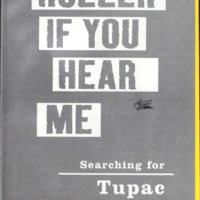-
Title
-
Holler if you hear me : searching for Tupac Shakur
-
Description
-
Through original interviews and reporting, [the author] offers us a wholly original understanding of the controversial icon who has been called the 'black Elvis'.--Dust jacket.
-
Identifier
-
969569
-
046501755X
-
Creator
-
Dyson, Michael Eric
-
Source
-
Brian Lamb Booknotes Collection
-
Gift of Brian Lamb, 2011.
-
Catalog record
-
Language
-
eng
-
Date
-
2001
-
Program air date: November 4, 2011
-
Publisher
-
Basic Civitas Books
-
George Mason University. Libraries. Special Collections & Archives
-
Text
-
Transcription of Annotations
Notes from half title page: "Mother - Afeni - revolutionary and drugee. - Harlem - Baltimore School for Performing Arts. - Voracious reader. - Dropped out of high school, no father. - "Real nigga". - Sexual abuse for which he was convicted. - His view of females.- How he viewed his own body. - "Not dead yet". - Thug persona. - Alice Faye Williams - Afeni - b. 1947 in N.C. (moved to NYC at 11). - Tupac - Shining Serpent. - Shakur: Arabic for "thankful to God". - Black Panther Party / New York 2 - Who were they? - She was bailed out of jail - Leonard Bernstein / Jane Fonda; $10,000. - East-West fight began with Afeni's blast at Panther Headquarters in West. - Tupac's father Billy Garland. - Tupac at 13; family went to White Plains - homeless world. - 1986: move to Baltimore, then to Main County. - Crack cocaine - Afeni abandoned Tupac; she says at 17, he says 13. - Tupac tough on Afeni - unforgiving; blame is put on "black village". - Who makes the money off the black rappers? - Leila Steinberg changed his life; came across in park in S.F. - Shot in Vegas. - Jada Pikett Smith - Tupac asks her mother if he could marry her - no, because of drugs. - Heavy reliance on weed and alcohol. - He had a strong relationship with God, p. 207. - Big Syke: philosophy on God and killing, p. 211. - Pac was not happy on earth - Why? - Prison, 11 months, "killed my spirit". - Going to stop thugging before prison. - Why unhappy? - Sexual - raped in prison? - Lashed out at Biggie and Combs; felt they set him up in attempted robbery of N.Y. recording studio. - Soul Train Music Awards. - Tupac slept with Biggie's wife, p. 224?" - Annotations by Brian Lamb in the margins and underlining of pertinent phrases throughout the book. -- Examples: p. 13: "Tupac is perhaps the representative figure of his generation." - p. 22: "If the mother is central in black life, she is also made a scapegoat for the social disintegration of black culture." - p. 36: "Of all the crimes that crack exploited - the drive-by, the purse snatch, the television steal, the body sale - one of the most heinous was child abandonment." - p. 64: "It cannot be said that Tupac bore the burden of his heritage with grace. He sported his pedigree in reckless pride." - p. 124: "Many older blacks fail to see that the same folk who thought it was just fine to keep black life segregated and economically inferior are now leading the charge to incarcerate their children." - p. 170: "His stirring raps made many people see suffering they had never before acknowledged. It helped many desperately unhappy young people reclaim a sense of hope and humanity." - p. 265: "He embodied the harsh, callous death of thousands of anonymous black males victimized by arbitrary violence and, often, the violence they provoked."
-
Subject
-
"Shakur, Tupac, 1971-1996."
-
"Rap musicians--United States--Biography."
-
Relation
-
Original Booknotes interview
-
Rights
-
This work may be protected by copyright laws and is provided for educational and research purposes only. Any infringing use may be subject to disciplinary action and/or civil or criminal liability as provided by law. If you believe that you are the rights-holder and object to Mason’s use of this image, please contact speccoll@gmu.edu.
 969569.pdf
969569.pdf